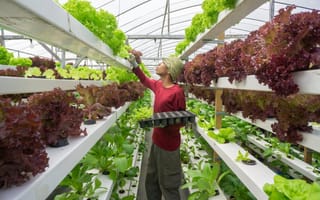Vertical farming is the process of growing crops on vertical, stackable surfaces rather than horizontal surfaces. This type of farming, which usually takes place indoors, uses a fraction of the water and land needed in traditional farming. With locations across the United States, here are the top vertical farming companies changing the way we cultivate food.
Top Vertical Farming Companies
- Oishii
- Bowery Farming
- Infinite Harvest
- Freight Farms
- Plenty
- Futurae Farms
Top Vertical Farming Companies to Know
Headquarters: Jersey City, New Jersey
Oishii grows strawberries and tomatoes at its indoor vertical farming facility that relies on innovative technologies to deliver produce that’s free from pesticides and genetic modification and is available throughout the year. Consumers can purchase Oishii’s produce through select retailers in Texas, Virginia, Washington, D.C., New York, New Jersey, Pennsylvania, Connecticut, Maryland and Massachusetts.
Headquarters: New York, New York
Since 2015, Bowery Farming has been using indoor vertical farming to produce crops that it says are more reliable and less harmful for the environment. The company’s BoweryOS operating system uses artificial intelligence to monitor each crop and alert farmers when it’s time to harvest. With three vertical farms in New Jersey, Maryland and Pennsylvania, Bowery’s produce ranges from strawberries to lettuce and other greens and can be purchased at Walmart, Safeway and Amazon.
Headquarters: Lakewood, Colorado
Infinite Harvest uses vertical farming and hydroponic tech to grow microgreens. According to the company’s website, its indoor vertical farm can grow the same amount of produce as a two-acre farm each month. Infinite Harvest sends its microgreens and lettuce to Denver-area restaurants and grocery stores, including Whole Foods Market.
Headquarters: Boston, Massachusetts
With a network of more than 600 farmers across the world, Freight Farms makes hydroponic shipping containers that allow individuals to grow food 365 days a year. Freight Farms also offers services like video guides, events and an agricultural system to help people along their vertical farming journey, from lettuces and herbs to edible flowers and roots. Freight Farms containers can be found in 41 countries and 49 U.S. states and territories.
Headquarters: San Francisco, California
Plenty uses AI and robots to grow pesticide-free greens in indoor vertical farms. The company has a location in Laramie, Wyoming, and is building two new locations in Compton, California, and Richmond, Virginia. Founded in 2014, Plenty has raised $941 million to date, including a $400 million Series E — one of the largest venture capitals raises in the Bay Area in 2022
Headquarters: Los Angeles, California
Next-generation farming and tech company Futurae Farms aims to create a more nutritious and accessible future. Through vertical farming, Futurae will grow local produce mainly in urban centers, according to the company’s founders, which will allow Futurae to mitigate supply chain issues and farming’s effects on climate change.













